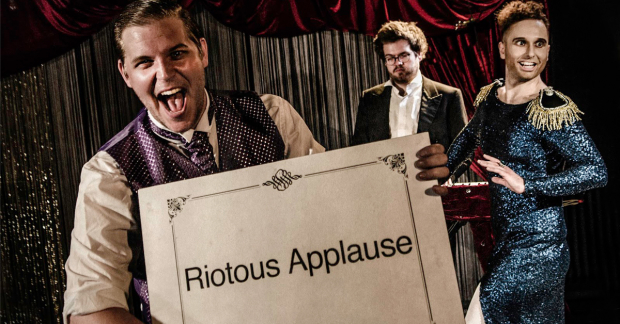Edinburgh review: How To Win Against History (Assembly George Square)
A deliriously entertaining biographical musical about Henry Cyril Paget, the 5th Marquis of Anglesey

How to Win Against History: A Practical Guide in honour of Henry Cyril Paggett, Fifth Marquis of Anglesey.
1) Live in such opposition to your times that you make next to no bearing on it in your lifetime whatsoever.
2) Get yourself written out of it.
3) Be vindicated by it.
4) Find yourself the subject of a ludicrously enjoyable, dizzyingly clever cabaret bio-musical at the Edinburgh Fringe.
Gold epaulettes on his empire blue sequinned gown, Seiriol Davies is Henry Cyril Paget, the fifth Marquis of Anglesey: dreamer, egotist, cross-dressing Victorian aristocrat. A man who blew the entire family fortune – and there was a lot of it – on sparkly things and star-vehicles, Paget died, penniless, aged 29, in Monte Carlo, before his family removed all trace of him from the history books. His obituary, almost the only surviving record of his existence, described a man of "the wildest folly" who "lived in vain." Ouch.
Paget is gloriously – and ambiguously – resuscitated in Davies’ helium-balloon of a mini-musical; held up as both an example to us all, a lesson in living the life you want, and as a serious question mark for every artist to consider.
His story is told with a ton of twinkle. Davies plays him wide-eyed and wondrous; beaming back at a world that understands him as little as he does it. Eton-educated, he’s squeezed out of an establishment that conceals its own queerness beneath respectable tweeds, and after his sham-marriage breaks down, turns to theatre to change the world. (Ha!) Davies gives him a monstrous little voice, too delicate to have any impact, and his songs – music hall ditties with a wit to match Tim Minchin – have a featherlight tweeness that makes them seem throwaway.
Beneath its biographical surface – and, goodness, Paget lived quite a life, covering his wife with diamonds in lieu of sex and converting the family chapel into a theatre – How To Win Against History is really an argument about the avant garde and art.
As Paget tours his shows, next to nobody turns up. Certainly, nobody gets them, no matter how much he sings about wanting to be "mainstream entertainment". He and his fellow actors are having a ball. Is this, then, empty narcissism? Art for artists’ sake? It’s telling that Paget, like so many contemporary stars, went to Eton. He could afford to make art and you admire the utopian spirit of his splashing cash on it, even as you clock the self-indulgence, the sheer waste, of doing so.
This, then, is a show that questions itself relentlessly – who it’s playing to and why; whether it counts for anything anyway. After all, wasn’t Paget doing the same thing a century ago?
Ultimately, Davies finds an answer in form: the simple fact of being deliriously entertaining. There’s a radical populism to cabaret, and this is a knobbly knees-up. It smuggles politics and queerness in with a smile, and Davies pushes ahead by revisiting the past, updating Victorian variety with a glint of irony. It makes for something utterly accessible, apparently familiar and radically progressive. Paget himself would be proud.
How to Win Against History runs at Assembly George Square Theatre until 28th August.












